Dental Implants
A Comprehensive Method for Rebuilding Smiles
If you’re struggling with tooth loss, you might be wondering if there’s a way to completely rebuild your missing teeth. While traditional prosthetics like dental bridges and dentures offer reliable replacements, dental implants can restore an entire tooth from the roots up. At My Dentist Midtown, we can help you regain your full smile with these lifelike and incredibly stable tooth replacements that will look and work exactly like your natural teeth. Keep reading to learn more about dental implants or call us to schedule your initial consultation so we can get started on rebuilding your missing pearly whites!
Why Choose My Dentist Midtown for Dental Implants?
- Fully Customized Treatment Plans
- Partnered with Local Dental Implant Specialists
- Dental Insurance & Flexible Financing Welcome
What Are Dental Implants?
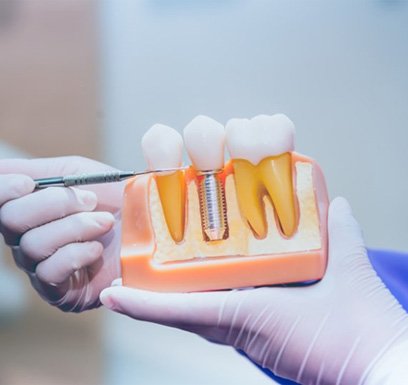
A dental implant consists of a dental crown connected typically to a titanium post via an abutment that is strategically placed within the jawbone to serve as a new tooth. Not only does the porcelain material mimic your natural tooth enamel, but the post itself is also biocompatible and can easily bond with the bone tissue, meaning that your results should be incredibly strong and stable. You shouldn’t have to worry about your new teeth moving out of place when eating or speaking, and your results can generally last several decades with proper maintenance.
The 4-Step Dental Implant Process
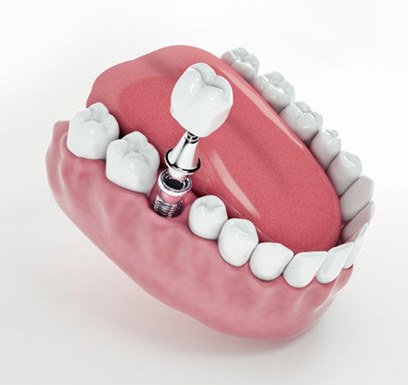
Due to their complexity, dental implants have a longer treatment process than dentures or dental bridges; getting them takes several months. The good news is that the posts are worth this time and effort! By partnering with local implant specialists, My Dentist Midtown ensures you have the best treatment results and supervision. Trained professionals oversee all steps of the implant process, including consultation, implant surgery, osseointegration, and delivery of the final restoration.
Initial Dental Implant Consultation

For the initial consultation, you’ll simply have a brief chat with our dentists. This talk lets us learn about your treatment goals, oral health background, and other key details. We’ll use such feedback to confirm whether dental implants suit you and tailor your final care.
Please don’t worry if we decide you don’t qualify for dental implants. With preliminary dental work like gum disease therapy or tooth extractions, you can become a good treatment candidate later. These procedures would strengthen your mouth to handle and withstand implant posts.
Dental Implant Surgery

If your consultation goes well, you’ll later undergo the next treatment phase: dental implant surgery. This procedure is done by local implant specialists we trust, so rest assured; your new teeth will be placed safely and effectively!
Expect your dental implant surgery to involve:
- Anesthesia – Before surgery starts, an oral surgeon will numb your treatment site with anesthesia. This step ensures your placement is painless; it won’t cause any aches or pains.
- A Minor Incision – Specialists will make an incision in your gums after the anesthesia “kicks in.” By doing so, they’ll make room for your final implant post.
- Implant Placement – The specialists will use advanced tools and methods to precisely place your implant post.
- Gum Closure – Once the placement is done, an oral surgeon will close your gum incision. They’ll then set a cap over your new implant.
Dental Implant Osseointegration & Abutment

The dental implant slowly fuses with bone tissue after the placement surgery. Through that 4–6-month process (i.e., osseointegration), your post will take root in your jawbone. It’ll then become a permanent prosthetic tooth in your smile.
Following the fusion, you’ll have to attend another surgery. This “extra” treatment places an abutment – a metal connector – on your implant post. While you recover from that, a dental lab will craft your final restoration over several weeks.
Delivery of Dental Implant Restoration(s)

To wrap up your treatment, we’ll deliver your implant’s final restoration. What kind of prosthetic you get will depend on how many teeth you’ve lost. Based on the final tally, your final device could be a single dental crown, a dental bridge, or an entire implant denture.
It ultimately won’t take long to fit your final restoration. To do so, we’ll just apply dental cement to your abutment, set the device, and make some last-minute changes. We’ll then send you off when it’s clear your post fits well, letting you enjoy your restored smile!
Benefits of Dental Implants

Since more than half a million dental implants are placed annually, they are quickly becoming one of the most popular ways to restore lost teeth. Because of the unique way in which they are surgically placed in the jawbone, these devices can deliver a wide range of important benefits that traditional restorations like dentures and dental bridges cannot match. Here’s a brief overview of how Drs. Stephanie Flinchum and Areon Smith can dramatically enhance your health, self-image, and quality of life.
Day-to-Day Benefits

Dental implants offer several benefits that you can notice in your day-to-day life such as:
- Restoring almost all your chewing ability so you can enjoy many tasty foods that are difficult to eat with dentures such as juicy steaks, raw fruits and veggies, and crunchy nuts and seeds.
- Requiring only the same oral hygiene routine as real teeth, which means that patients can forego the elaborate and time-consuming cleaning rituals required by traditional dentures.
- Providing your restoration with a stable foundation that eliminates the risk of it sliding about on the gums, which can lead to slurred words and chewing difficulties.
- Giving you a smile that you’ll be proud to show off, which can make socializing and making positive impressions at work much easier.
Health Benefits

Dental implants can also impart a few incredible benefits for the patient’s oral and overall health such as:
- Being easy to clean, which can help the patient avoid oral infections like gum disease, tooth decay, and abscesses.
- Protecting the gums from injury.
- Providing the jawbone with the exercise it needs to stay healthy, strong, and shapely.
- Enabling the patient to eat a wide variety of nutritious foods, which can help them maintain a healthier diet.
- Preventing indigestion by allowing the patient to chew thoroughly.
Long-Term Benefits

Dental implants can be a sound long-term investment that delivers impressive benefits like:
- A 95% success rate even ten years after being placed.
- Lasting for a lifetime if they receive excellent care.
- Not needing expensive replacement appliances, which would be required by traditional dentures and dental bridges. This can save a patient vast sums of money over the decades.
- Giving the patient the confidence they need to smile proudly at work and at social events, which can lead to new friendships, make it easier to close sales, or make it easier to stand out from the competition when being considering for a new job or a juicy promotion.
Who Dental Implants Can Help

Anyone who is missing teeth can benefit from dental implant treatment. Of course, we’ll need to ensure that you have good oral and overall health before moving forward so that we can avoid complications and/or failure. Once we’re able to revert or fix any underlying issues with your oral health, we can move on to replacing any number of pearly whites.
Missing One Tooth
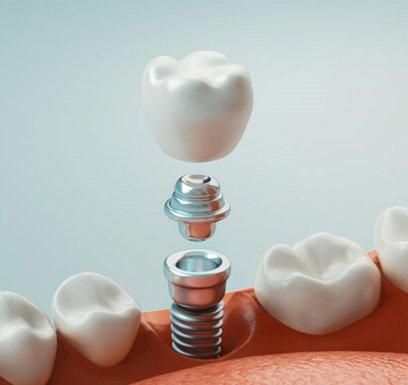
Instead of using a dental bridge to close a gap and altering nearby teeth to support it, you can receive a dental implant and connect a crown to it to replace your missing tooth.
Missing Multiple Teeth
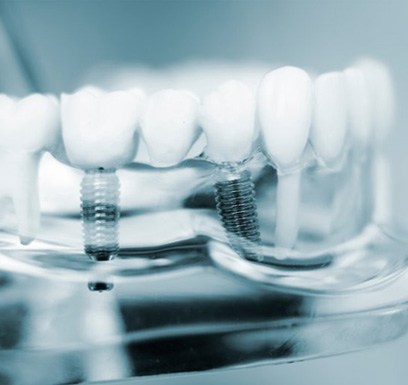
While you might consider traditional a dental bridge or partial denture to replace several teeth, you might be able to have a couple of implants placed to support your prosthetics instead. This can offer much more stability and reliability for everyday oral tasks, like chewing and talking.
Missing All Teeth
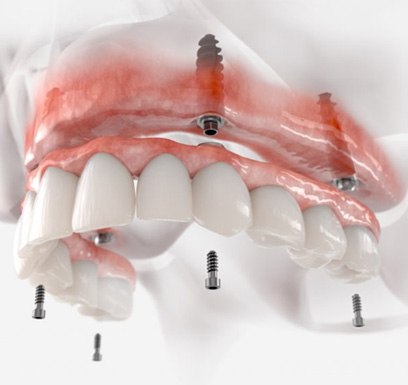
If you’ve lost all of your teeth, you can get four to six dental implants embedded into your jawbone to support a full denture. Not only will you be able to enjoy a stronger bite, but you’ll also avoid issues like gum irritation or soreness that’s common with traditional restorations.
Understanding the Cost of Dental Implants

When it comes to dental implants, every patient has their own unique needs to consider, which can affect the financial aspect of the treatment. During your initial consultation, we’ll give you an estimate of what the cost of your dental implants will likely be, and we’ll explain what options exist for making the treatment more affordable. You can count on us to help you rebuild your smile while making sure you aren’t putting too much strain on your bank account.
Preliminary Treatments & Dental Implant Surgery

Sometimes you may need to have bone grafting, tooth extractions, and other preliminary treatments performed prior to receiving your dental implants. Before you commit to any of these services, it’s important to make sure that you fully understand the costs associated with them as well as why they’re necessary.
As for the actual dental implant surgery, the cost won’t be exactly the same for every patient. Our team will refer you to a local specialist for dental implant placement; they’ll be able to go into more detail about what the price tag for the surgery will look like.
The Parts of Your Dental Implant

The cost of the dental implants themselves is not set in stone. It can be significantly influenced by several factors, such as:
- The exact number of implant posts that are required to replace all of your missing teeth.
- The type of prosthesis that the implant posts will support (which could be a crown, a bridge, or a denture, depending on the situation).
- The materials used to make the implant posts as well as the prosthesis.
- The brand of dental implant selected.
How Dental Implants Can Save You Money

Compared to traditional bridges and dentures, dental implants are more expensive initially, but they also have much longer lifespans; in fact, it’s not unusual for them to last for the rest of a patient’s life. As such, dental implants can ultimately save you money because you won’t have to worry about replacing them every 5 to 10 years. On top of that, there’s no need to buy any special solutions to take care of dental implants; you can give them the same kind of care as your natural teeth.
Does My Dental Insurance Cover Dental Implants?

The answer to this question can vary from patient to patient. Many dental insurance plans classify dental implants as an elective procedure and therefore will not offer coverage for them. Nevertheless, you may still be able to use your insurance plan to help pay for certain parts of the dental implant process, such as the final prosthesis and certain preliminary treatments. Before you commit to getting dental implants, it’s advisable to call your dental insurance carrier to clarify your benefits.
Making Dental Implants Affordable

If you break up the cost of dental implants via third-party financing, it can go a long way toward making the treatment more affordable. Our team is happy to help our patients apply for financing through CareCredit, which offers a number of payment plans that come with little to no interest. Reach out to our team if you would like to learn more about CareCredit and how it might benefit you.
Dental Implant FAQs
How Long Do Dental Implants Last?
Dental implants may last for thirty years or possibly a lifetime, but the most important factor in the longevity of your restorations is how well you take care of them with your hygiene and lifestyle habits. It’s important to brush, floss, and rinse with antibacterial mouthwash every day to eliminate plaque and food debris and attend regular dental checkups at our Tulsa office so we can address problems in their early stages. It’s also crucial to refrain from bad habits such as smoking, excessive alcohol consumption, chewing on inedible objects, and using your teeth to open packages or bottles. With excellent care, dental implants can last many times longer than traditional restorations like dentures and bridges.
Does Getting Dental Implants Hurt?
You will receive a suitable anesthetic to ensure your comfort before the dental implant placement procedure begins, and you may also receive a sedation treatment if you need extra help staying calm. Since the jawbone does not have many nerve endings, it is not terribly sensitive to pain in the first place. While the procedure itself should not hurt, you may experience some soreness for several days afterward. This can be managed with prescribed or over-the-counter pain medication, and many patients find that ice packs or cold compresses can also help them find relief. However, contact our office in Tulsa if your discomfort seems to be getting worse instead of better after several days or if you experience issues like fever, fatigue, swelling, bad breath, or a foul taste in your mouth, as these may be signs of infection.
Are Dental Implants Safe?
Dental implants are incredibly safe for most patients in good oral health as long as they are placed by a trained professional such as Dr. Flinchum. While issues like low jawbone density or gum disease may preclude you from receiving the treatment when you have your initial consultation, many patients will be able to become excellent implant candidates after having these problems cleared up with periodontal therapy or bone grafts. While medications like blood thinners and health conditions like pregnancy, hemophilia, osteoporosis, cancer, and diabetes can complicate the process, they do not necessarily disqualify you from receiving dental implants. However, be sure to mention any of these to Dr. Flinchum when you have your consultation so she can plan your treatment accordingly.
How Successful Are Dental Implants?
Dental implants placed by skilled professionals such as Dr. Flinchum boast a success rate of over 95% even ten years after being placed. However, the most important factor in how long yours will last is how well you take care of them with excellent oral hygiene, smart eating decisions, regular checkups, and protective measures such as mouthguards when necessary. Implants that replace molars endure more force during the chewing process, so they may be more likely to fail sooner than devices replacing the front teeth.

